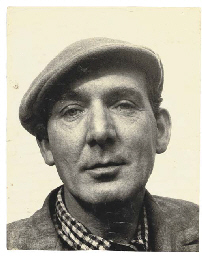 English poet George Barker was born in the Loughton, Essex, in 1913 and is considered one of the livelier characters of 20th century literature. T.S. Eliot said Barker was a genius and his life was often as turbulent and extravagant as his verse, fathering fifteen children over his life time by different partners. Although he is barely remembered in the public consciousness today, Barker was one of the most original and vibrant poets of his time.
English poet George Barker was born in the Loughton, Essex, in 1913 and is considered one of the livelier characters of 20th century literature. T.S. Eliot said Barker was a genius and his life was often as turbulent and extravagant as his verse, fathering fifteen children over his life time by different partners. Although he is barely remembered in the public consciousness today, Barker was one of the most original and vibrant poets of his time.
Brought up in Battersea in the heart of London by his English father and mother of Irish decent, Barker went to Regent Street Polytechnic but, like many of his peers, left at a young age to begin work. Whilst he tried his hand at many different jobs he also began writing when he was in his twenties, publishing his first collection, Thirty Preliminary Poems, in 1933.
He was helped in his poetic endeavors by support from T.S. Eliot, became a drinking buddy of Welsh poet Dylan Thomas, who envied his ability to attract women, and was a friend of writer John Middleton Murray.
Whilst he continued to publish works during the ‘30s, including Calamiterror which was influenced by the Spanish Civil War, he did not achieve much recognition until the publication of Lament and Triumph in 1939. Barker wrote extensively about sex and was controversial for his time, living a wild and often irresponsible life that befitted his bohemian reputation.
Barker was a heavy drinker and used drugs such as Benzedrine and Methedrine. Neither did he live in one place for much time and was known for the fact that he never owned a home during his entire life.

The publication of Eros in Dogma in 1944 earned him a wider reputation by which time he had also spent time, in 1939, in Japan as a professor at Tohuku University, though he left when hostilities broke out at the beginning of World War II. He wrote Pacific Sonnets during this time and then went to the US where he began a highly publicized affair with Elizabeth Smart who wrote By Grand Central Station I Sat Down and Wept, a semi-autobiographical account of her relationship with Barker.
Throughout his writing career Barker was always able to engender a high level of outrage, particularly when his poems were read on the BBC. He wrote pornographic stories with the likes of Anaïs Nin and once caused public consternation by professing that a ‘woman’s duty’ was to be beautiful. Perhaps his most memorable and critically successful work was The True Confession of George Barker that was published in 1965, which took its lead from Byron’s Don Juan and was loudly denounced as pornography by prominent politicians of the day when it was broadcast on the radio.

Despite his controversial subject matter, Barker was awarded the Guinness Prize for Poetry in 1962 and followed that up with the Levinson Prize a few years later. Though having lived in the US and Italy, among other places, in the later years of his life he found his way to Norwich and largely fell out of the public eye. In 1991 he suffered from emphysema and passed away at the age of 78 whilst staying in Itteringham in Norwich.

